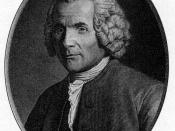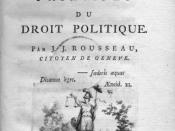In a society based on private property, a conflict arises between private economic interests and the general interest of the society. For this to be minimized in favor of the general will, Rousseau advocated a return to simple society based on a primitive economy. In his critiques on civil society, Rousseau identifies the division of labor, private property and exchange as the central causes of moral and political corruption in that society. Interestingly, he considers private property and exchange to be inevitable, if economic cooperation is to take place (Birkhead 18) and hence to be the cornerstones of society and prerequisites for civilized living. This places him in the awkward position of criticizing the economic system based on private property and exchange while defending these institutions themselves. For Rousseau, the nature of man is important in understand natural rights and laws - talk further about the nature of man.
Rousseau asserts that there is a large gap between sensations and knowledge, something so significant that it would have required centuries to cross.
Tools and the concept of agriculture are two such examples. It would have been impossible for agriculture to develop without the notion of property or private possessions. Savage man was not thought to be intelligent, but rather simple with modest desires. If savage man was in fact intelligent, intelligence would be of no value without being able to communicate thoughts or ideas. As a result, if one steps back and looks at the great importance of language in society, it can be understood as to why it took so long to develop. The concept of laying claim to one's own property was one of the contributing factors that necessitated the introduction of language.
"The first person who, having enclosed a plot of land, took it into his head...


